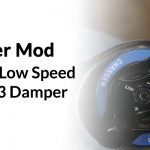The DPX2 has been the latest and greatest release out of Fox and has dominated the medium / high rear shock OEM from Pivot, Transition, Yeti, Santa Cruz, and more. The shock is a complete revamp of Fox’s previous flagship enduro/all-mountain shock, the Float X.
Without getting into the weeds, the internals of the DPX2 utilize a recirculating oil design, similar to that of the Float X2, but in a bit of a condensed version. The DPX2 uses a hybrid approach with a poppet design in the head of the shock but shim stacks on the main piston, which are the main modifiers of compression and rebound characteristics in the shock. The Float X2 (and dhx2) rely heavily on poppet-driven damper circuit, leaving only lockout and very high speed compressions to the shim-stack.
The interesting change, which we have seen in the Deluxe shocks from Rockshox and in certain fork dampers from DVO, is the use of digressive damping tunes in the DPX2. Digressive damping allows smaller, slower, movements to be controlled better -exuding the feeling of “support.” The digressive damping curve also allows for a tapered (less) damping curve towards the upper ends of velocity (think curb-smash high speed compression) allowing unexpected hits to soaked up without feeling “harsh.”
The DPX2 generation 2 evol aircan features a smaller, highly tunable, air can with much less volume than that of the X2. This small air chamber is great for linear (or regressive) frame designs or “clydesdale” riders who need to add a progressive spring curve to their frame.
Factory and performance elite (OEM only) allow for low-speed compression in the open mode and a 3-position compression (climb) switch. Furthermore, Fox published over 15 “stock” valving assemblies, not including valve specs developed for specific frame-tunes, which goes WELL above and beyond the average 3-5 tunes used in most other shocks. i.e. firm, med, light tunes.
Bike/Rider data: Yeti sb5.5 155lb rider. 170mm Fox 36 reduced offset, 1.5mm off-set rear bushings. Playful riding style
DPX2 $554 USD
Pros
- Out of the box performance (with the frame spec tune)
- Digressive compression tune great for riders who want more than just a super-supple ride
- Low speed compression for added support through smooth, pumping terrain
- Smaller air can volume allows for a very progressive curve (volume spacers)
Cons
- No ability to independently adjust high speed compression / rebound
- Slightly more “fade” than x2
- Off the shelf valve stacks may not be appropriate for your frame (needs tuning)
- Lighter weight riders may want a little less compression (especially if a digressive tune)
Float X2 2-pos $655
Pros
- 4-way adjustability for varying terrain and styles
- Very compliant coil-like feel (off the top)
- Handles repetitive hits better than the DPX2 (may not be true for riders under 140lbs due to inability to get rebound fast enough)
Cons
- Heavier
- Only 1 climb position (not as firm as full climb on DPX2)
- Airsleeve maintenance requires disassembly of the damper
- Requires extra setup
- Cannot get as progressive as DPX2 *2019 models are better with new aircan design
So, which is the better shock? Well, it depends on rider type and your willingness to turn knobs, change volume reducers, etc.
I tested these two shocks on trails from Moab to Trestle Bike Park to the local flow trails. One thing to note is that I fit the mold of the “expected rider” pretty darn well, meaning the valving Yeti chose for the frame was pretty spot on for me. i.e. 155lb aggressive rider. The decision was hard for me but, being a suspension tinkerer, I chose the external adjustability of the Float X2 over ease of use of the DPX2. Additionally, being a lighter weight rider means that I could get away with the amount of “ramp” with the x2 can which is fully stuffed with the orange volume spacers.
Set it and forget it? Go custom DPX2. Additionally if you are pairing with a linear frame or are over 180lbs, I would steer the majority of riders towards a custom valved DPX2. For more progressive frames, or lighter weight riders, the Float X2 can beat out the DPX but requires the extra-mile in setup
I would stress that if go with the DPX2 (we offer trade ins!) spend the extra $40-$80 on a custom valve stack as aftermarket DPX2’s are only offered in one configuration from Fox. We choose DPX2 tunes by looking at the frame leverage rate / curve and learning about the rider: i.e. “I ride lots of park and jump a lot.” Or “I am 65 and just want it to soak up the bumps.”




